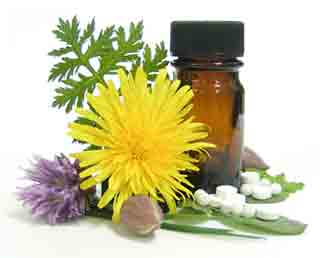|
Herbal remedies can be a more natural alternative to treating medical problems, but they also have their dangers.
by Jen Schripsema
 Photo courtesy
of Luke Hansen
Photo courtesy
of Luke Hansen
A herbal
solution? Many people are now choosing to treat their medical
problems with herbal remedies.
|
|
Many people are now choosing to cut out the middleman by treating their medical problems themselves with herbal supplements. The face of herbal medicine, once dominated by patchouli-scented hippies and gauzy New Age types, is changing. Soccer moms are treating their children's colds with chicken soup and echinacea and college students fuel all-night study sessions with energy drinks boasting ginkgo and ginseng. Even in your local convenience store, snacks and drinks touting herbal ingredients are slowly encroaching on traditional junk food territory.
Every year, the Centers for Disease Control and Prevention (CDC) conduct a health survey of American households and a variety of other groups may request supplemental surveys as well. In 2002, the National Center for Complementary and Alternative Medicine, which studies everything from yoga to acupuncture, sponsored a supplemental survey to measure herbal and dietary supplement use.
What the Survey Said
Jae Kennedy of Washington State University used this information to provide the first detailed national portrait of herbal medicine in the U.S., which was published in Clinical Therapeutics in January 2006. He found that echinacea, ginseng, ginkgo and garlic were, in that order, the most common herbs regularly taken by Americans. Nearly one fifth of Americans (38.2 million people), regularly took at least one type of herbal or dietary supplement. This number had doubled in only three short years since the previous survey in 1999 and is likely to be even higher now.
Kennedy found that regular herbal and dietary supplement use was higher among women, middle-aged adults, and college graduates. People with multi-racial, Asian, or Native American backgrounds also reported a higher usage. Using herbs and dietary supplements seems to be part of a concerted effort to improve health: generally, herbal supplement users exercise regularly, no longer smoke cigarettes, and report being in good or excellent health.
Kennedy's findings also show that most people use herbal medicine to complement conventional medicine, not to replace it. "For some conditions like depression and chronic pain, herbs might be a less toxic, less extreme kind of solution," says Kennedy. "These kinds of conditions are tough to treat effectively with conventional drug treatment."
The evidence suggests that many people are satisfied with alternative treatments of chronic conditions. A study from Harvard researchers published in 2001 in the Annals of Internal Medicine showed that almost half of the people who had tried some type of complementary or alternative medicine were still using it 11 to 20 years later.
Not So Safe
There are, however, a number of concerns about the use of herbal medicine. "Of all the complementary and alternative medicines, herbal medicine has, I think, the most potential but also the most risk to patients," says Kennedy. "There's this impression that herbs are safe and natural. But they can interact with other drugs and other herbal products and cause serious health consequences." Unfortunately, most people and even many physicians are not aware of the potential dangers.
 Photo courtesy
of Jen Schripsema
Photo courtesy
of Jen Schripsema
St John's
Wort: This herbal supplement can interfere with the effectiveness
of birth control pills and prescription blood-thinners.
|
For example, St. John's Wort can decrease the effectiveness of birth control pills. Feverfew, garlic, ginkgo, ginseng, and ginger all thin the blood; using any of these herbs in combination with prescription blood-thinners can lead to uncontrolled bleeding. Ginseng alters blood glucose levels and should never be used by people with diabetes.
The perceived safety of herbal supplements leads many people to use them without supervision. Only 5% of those taking herbs were doing so under the care of an alternative medicine provider. Additionally, two-thirds of people using herbal supplements did not tell their physician.
Herbal medicine use may also reveal fundamental problems with access to healthcare. Kennedy is currently involved in research that shows that St. John's Wort use is higher in people without insurance or a primary care physician. "They are self-treating with cheap, unregulated alternatives because they can't afford to pay for prescription medications and psychiatry visits," says Kennedy.
The U.S. Food and Drug Administration (FDA) classifies herbal supplements as a food, not a drug. They are, therefore, not subject to the same testing, manufacturing, and labeling standards as prescription and traditional over-the-counter drugs. "There is no enforcement using current regulation," says Kennedy. "When you've got for-profit companies selling these products and treating them as benign dietary supplements instead of drugs, that's potentially a problem."
Companies may mislabel, misidentify, or adulterate the products they sell. A study published in May 2006 in the Journal of Agricultural and Food Chemistry underscored the extent of this problem. Researchers from Columbia University and the City University of New York tested 11 commercially available brands of black cohosh, used to treat symptoms of menopause, and found that three of those products contained no black cohosh at all.
Even when products are properly labeled, important information is often missing. "They are not sold with any warnings. The dosage is indeterminate," says Kennedy. "There's no clinical studies for the most part on appropriate dosing. There's certainly no placebo testing of herbal medicines, which is the gold standard for testing pharmaceutical products."
However, obtaining funding for this research can be difficult. "Since you can just go out and pick this stuff, the pharmaceutical industry isn't going to be interested in bringing things to market and identifying the active agents and synthesizing them. So there's no business funding for the kind of clinical trials we get for a lot of prescription drugs," says Kennedy. Governmental funding is available but limited and he says that since The National Center for Complementary and Alternative Medicine is a tiny component of the National Institutes of Health, they are trying to do a lot with a little budget.
Kennedy has suggested that future research should investigate the role of pharmacists in patient education about potential risks and benefits of herbal medicines. But until more research is conducted and stronger regulations are put in place, the advice "buyer beware" rules herbal medicine.
Kennedy envisions a future where patient care is a cooperative effort. "We're trying in this field to encourage at least informing your physician, but ideally moving towards an integrative medicine model where the physician, and the patient, and any complementary and alternative medical providers are working as a team."
For more information:
NutraIngredients: Plant-based drugs - room for growth?
http://www.nutraingredients.com/news/ng.asp?id=37212-plant-based-drugs
Washington State Unive5rsity - WSU Researcher Explores Growing Use of Herbal Medicine
http://wsunews.wsu.edu/detail.asp?StoryID=5582
|
